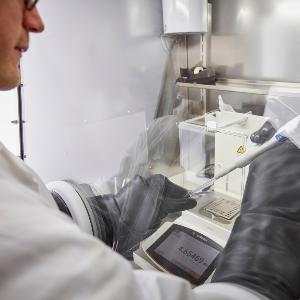Research transfer: LMU spin-off Tubulis concludes partnership for the development of cancer drugs
27 Apr 2023
Tubulis and pharmaceutical company Bristol-Myers Squibb enter strategic partnership to develop targeted antibody-drug conjugates.
27 Apr 2023
Tubulis and pharmaceutical company Bristol-Myers Squibb enter strategic partnership to develop targeted antibody-drug conjugates.

Tubulis develops antibody-drug conjugates. | © Stephan Höck
The spin-off Tubulis was jointly founded in 2019 by LMU molecular biologists led by Professor Heinrich Leonhardt at the LMU Biomedical Center and Professor Christian Hackenberger from the Leibniz Research Institute for Molecular Pharmacology in Berlin (FMP Berlin). Based on research findings on new methods for connecting functional molecules with each other, the company develops technologies for the manufacture of particularly stable antibody-drug conjugates (ADCs) that can be used therapeutically.
This research transfer is designed to further advance the development of such conjugates. Bristol-Myers Squibb (BMS) is gaining access to Tubulis’s proprietary platforms in order to develop versatile and adaptable ADCs for cancer treatment. The agreement provides for an upfront payment to Tubulis of 22.75 million US dollars along with potential milestone payments worth over 1 billion US dollars for development, approval, and commercialization as well as licensing fees for the resulting marketed products. “A portion of these proceeds will flow back to LMU and FMP through licensing agreements, where it can be used to support future research and development,” explains Leonhardt.
Many methods in the life sciences are based on equipping proteins, especially antibodies, with useful new properties. The researchers managed to connect toxic substances in a stable manner to antibodies that specifically bind to and are absorbed by tumor cells. In the interior of the cell, these active agents are then released and kill the tumor cells. As such, they combine the effectiveness of chemotherapy with the accuracy of antibodies and can be deployed to selectively kill tumor cells and mitigate the side effects of chemotherapy.
This basic technology was jointly patented by LMU and FMP and further developed and implemented by Tubulis. “The effectiveness, stability, and accuracy of our novel ADCs have now convinced BMS and led to this collaboration,” explains Leonhardt. “Tubulis is a shining example of the transfer of excellent research results through innovative and promising spin-offs,” adds Christoph Zinser, Head of the Spin-off Service at LMU, who advises and supports budding entrepreneurs in taking the first steps and securing spin-off funding. During the process of spinning out, Tubulis particularly benefited from the EXIST Transfer of Research funding program run by the German Federal Ministry for Economic Affairs and Climate Action.